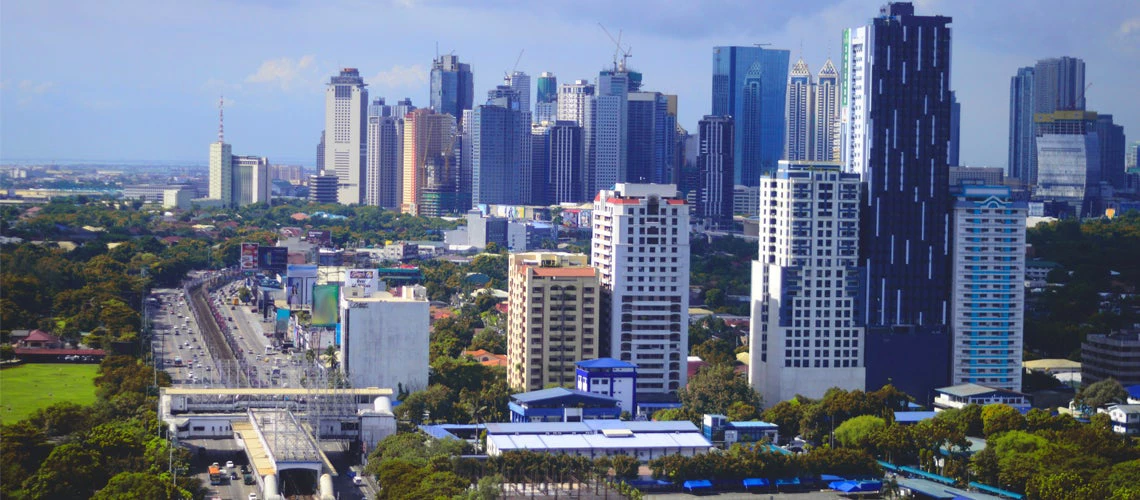 Cityscape in Quezon City, Philippines
Cityscape in Quezon City, Philippines
The Philippines is at a critical juncture in its urbanization process. By 2050, it is estimated that close to 102 million Filipinos will live in cities, about double the number of today. The rise of smart city solutions, backed by initiatives that have been planned and carried out in the country’s Local Government Units (LGUs), shows a promise for a brighter urban future in the Philippines.
In the Philippine context, a “smart city” is defined as an innovative urban area that uses technology and innovation to enhance the overall functionality, sustainability, and liveability of urban areas, making them more responsive to the needs of their inhabitants and the environment.
A recent survey by the Department of the Interior and Local Government (DILG) and the World Bank covering 115 urban LGUs highlights the progress in smart city development in the Philippines. The survey showcases effective practices adopted by LGUs and pinpoints areas where Filipino cities can benefit from guidance in visioning and strategizing their smart city solution adoption and innovation.
Status of Smart City Development in the Philippines
The survey revealed a substantial interest and progress in smart city development nationwide, showing that 70% of urban local government units (LGUs) are planning for such development. Additionally, 61% have smart city projects in progress, and 56% have established policies to support this development.
While these findings clearly show the aspiration amongst the LGUs to pivot towards a smart city transition, the survey also highlighted nuanced deliberations and associated challenges, which include:
- Integrated Planning: LGUs are integrating smart city plans into their development masterplans, highlighting their understanding that technological solutions should be integrated with overall urban planning and development.
- Resource Allocation: Although funding is a concern for 67% of the respondents, 72% of LGUs have allocated budgets to support smart city projects, reflecting a firm commitment to prioritize their smart city agendas.
- Collaborative Initiatives: Collaboration is the foundation of success for smart city transitions. A significant 56% of LGUs have existing institutional support or partnerships for smart city implementation. The support mainly comes from the national government (63%) and the private sector (18%). A gap persists in collaborations with theacademia.
- Focus Areas: Governance, Safety & Security, Infrastructure, and Urban Planning emerged as the top themes where the LGUs believe they could benefit significantly from smart city projects. Meanwhile, themes like Health & Well-being and Environment do not stand out, even though their significance has been recognized considering the recent pandemic.
- Other issues and challenges: LGUs also pointed out a lack of digital infrastructure & systems as a challenge (59%), and the technical competencies and manpower shortage were noted by many LGUs (57%).
Learning from Leading Cities
Leveraging the momentum in smart city development, the DILG and the World Bank hosted a workshop at the Philippines Urban Forum 2023 in Manila in October 2023. The event drew over 100 participants from various national agencies and LGUs and provided a valuable opportunity to exchange ideas and strategies. Key insights were shared by local leaders from Manila, Cauayan, Davao, Quezon, and Santa Rosa, complemented by international perspectives from Seoul, South Korea. Noteworthy strategies highlighted by these leaders include:
- Leading through innovations: LGUs are not only adopting innovations but also striving to be leaders in urban innovation. Cities like Cauayan are innovation leaders, inviting service providers to showcase and implement smart solutions.
- Financial Strategies: The workshop emphasized financial strategies for smart city projects, noting that 67% of surveyed LGUs see funding shortages as a major hurdle. Identified funding sources include national government sponsorship, loans, and general funds, potentially offering a diverse and solid financial foundation for these projects.
- Smart City Advocates: Some LGUs have designated smart city champions to spearhead smart city projects. These individuals coordinate initiatives, promote their city's vision, and build networks with other cities.
- Innovation Ecosystems: LGUs and their partners are focusing on creating innovation ecosystems. These ecosystems extend beyond physical spaces, they are platforms and mechanisms designed for collaboration among ideas, technology, and people. They offer opportunities for testing new concepts and developing the skills of local talent.
- Safeguarding Initiatives with Regulations: To ensure the continuity and sustainability of projects, LGUs will need to take proactive measures such as issuing ordinances. Such legislative action could ensure that smart city initiatives have the institutional backing to progress, even as LGUs’ administrative leadership changes every 3 years.
- Gaining Public Trust: Gaining public trust in implementation of the smart city agenda is important. Privacy and data security are crucial as cities digitalize and data volume increases. Ensuring data is protected and used responsibly will be fundamental to smart city development.
The Road Ahead
While national government agencies and LGUs’ enthusiasm and commitment towards smart city transitions are plausible, the journey faces significant challenges. Success requires a structured, collaborative approach involving various stakeholders. Key elements include ongoing support from funding bodies, building strong technical skills, and partnering with academia. Tailoring technologies to the Filipino urban context is essential for sustainable and inclusive solutions. In tandem with this, the DILG and the World Bank team are collaborating on creating a framework and a suite of tools for LGUs with enabling policies, capability development, technical expertise, and potentially paving the way for access to financing options.



Join the Conversation